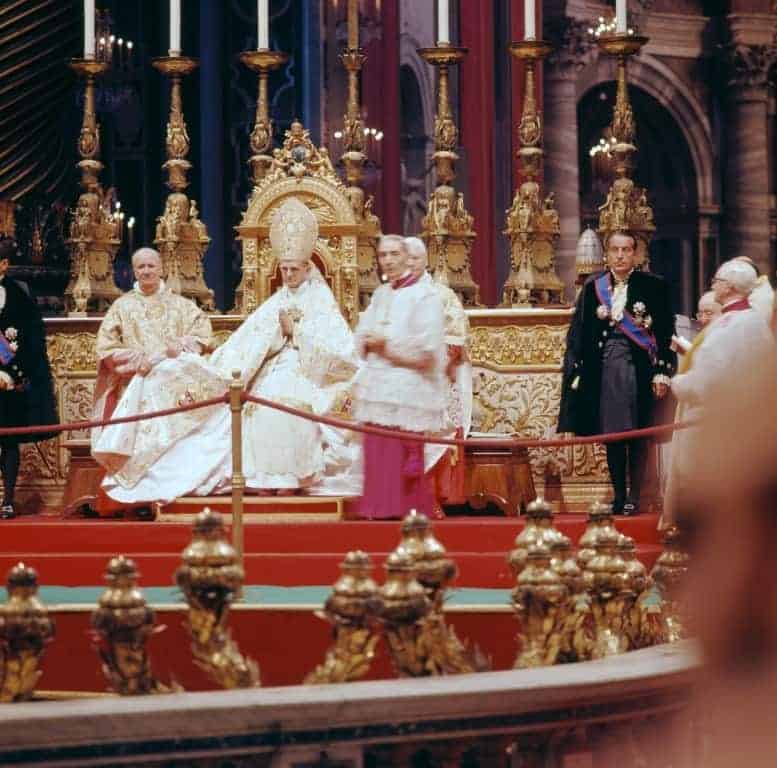To commemorate the 50th anniversary of the Second Vatican Council, and in particular its document on liturgy, Sacrosanctum Concilium, the Archdiocese of Milwaukee will hold a conference to discuss liturgy. I was reviewing the program that details some of the speakers and their topics. So disappointing. It’s dripping with liberal theological talking points one would expect to find at, well, a 1978 Milwaukee Archdiocesan forum on Vatican II. One thing’s for sure, you’ll learn a lot about “diversity” by attending. This conference is proof of what Pope Emeritus Benedict XVI spoke of when he discussed the success of the “Virtual Council“ over the real Council.
I came across this gem from the talk on the Real Presence:
Real Presence – Encountering the Sacred
What do Catholics mean when we use the term ‘Real Presence’? Is it only the real presence of Christ in the Eucharist, or do we mean something more? This workshop is designed to break open our Catholic theology of Real Presence (people, Word, minister, bread and wine [??!!]), and in so doing assist us to encounter the sacred nature of the Real Presence. (SC, 7)
Ms. Vicki Tufano
Liturgy Training Publications, Chicago, IL
Hmmm. I think Christ’s total presence in the Eucharist is quite enough. I would hardly use the word “only” when talking about that. Apart from Christ, what “more” is there? What “more” is necessary?
These deserve honorable mention:
Simplicity, Reverence and the Liturgy
Is liturgy an elaborate artistic production or a profound expression of the community’s participation in the Paschal Mystery? Can it be both? If so, how does this understanding of the Church’s worship manifest and inform the lives of the faithful? The Church exhorts us to celebrate the liturgy with “full, conscious, and active participation.” What does that really mean? Come and explore with us. (SC, 9-14)
Mr. Michael Novak
WLP Publishing, Chicago
The “active participation” line has been (mis)used to rationalize every manifestation of liturgical innovation under the sun. It’s no mystery what it really means. You don’t need a Weakland Decoder Ring to figure it out. Read The Spirit of the Liturgy. The secret is that some don’t want the Council’s actual meaning of “active participation” to get out because then we’d have to find another use for those streamers on sticks, banners, bazillions of “Eucharistic Ministers”, ushers, greeters, huggers, high-fivers, liturgical cartwheelers and trapeze artists, etc.
Change Across Diverse Cultures and Languages
“There are peoples who have their own musical traditions, and these play a great part in their religious and social life. For this reason due importance is to be attached to their music, and a suitable place is to be given to it.” (SC, 119)
Come to this hands-on workshop to discover how you might introduce people of other cultures to the predominant culture of your parish, and how other cultures may influence how your local community worships.
Ms. Barbara Tracey
St. Michael Parish, Milwaukee, WI
Will anyone talk about Sacrosanctum Concilium’s insistence on the preservation of Gregorian Chant, and its place of honor in Roman Catholic liturgy? Maybe someone will…
Many Songs, One Body: Fostering Unity and Embracing Diversity
“Religious singing by the people is to be skillfully fostered, so that in devotions and sacred exercises, as well as during liturgical services, the voices of the faithful may ring out according to the norms and requirements of the rubrics.” (SC, 118)
With liturgy celebrated in many languages, reflecting diverse cultural traditions, and employing music of many styles, how can liturgical musicians help us express and deepen our unity as the Body of Christ—and at the same time to embrace diversity as a gift?
Dr. Steven Janco
St. Joseph College, Rensselaer, IN
No comment necessary.
Question: Who is running this thing? Who vets the speakers to ensure that these kinds of hackneyed, 1960s clichés (clichés rooted in an ideology that has caused so much damage over the years) are kept far, far away? Clearly no one. The problem is that these people cherry pick selections from Church documents, like Sacrosanctum Concilium, and interpret them totally apart from the tradition of the Church, and apart from experts on Vatican II and liturgy like Pope Benedict XVI, and others. Or, they interpret them according the narrative of the Virtual Council, which has been nothing but destructive.
Do you think any of these speakers will bring up The Spirit of the Liturgy, God is Near Us, or anything written by Benedict on the subject of the liturgy or the Eucharist? This is why I cannot take any archdiocesan initiative on Vatican II seriously. They are stuck in liturgical time warp, circa 1978, that just keeps replaying the same loaded talking points over and over and over… The positive side to all of this is that young Catholics who take their faith seriously have no interest in a muddled multicultural Catholicism, and, for that reason, I am sure none will be attending. This kind of foggy feel-good stuff is extremely dated and unappealing, and the next generation has no interest in carrying the water for these people. I’m predicting an extremely low attendance. The negative side is that many of the architects of the Virtual Council still occupy positions of importance and wield significant power over day-to-day liturgical life at many parishes.



